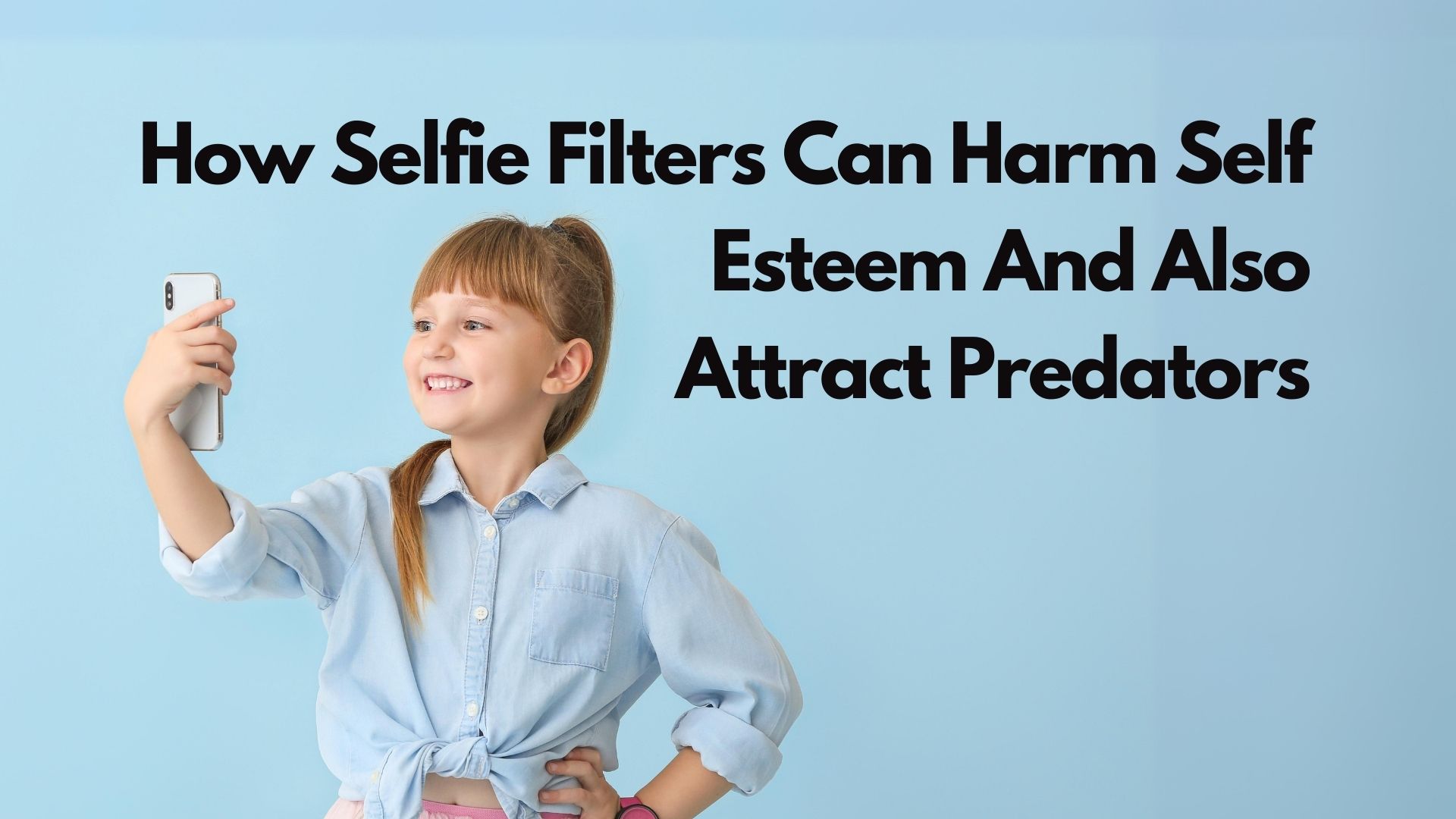Taking selfies has become a prevalent way to express oneself in today’s digital age. With the popularity of social media, visitors now have a wide variety of filters that can instantly improve their appearance with the click of a button. While these filters could appear to be a harmless way for our children and teenagers to portray themselves, they can have serious consequences. In this article, we will look at how selfie filters can potentially lower self-esteem and attract the attention of predators.
Impact Of Filters On User Self-Esteem
Self-esteem is a very important aspect of a child or teenager’s overall well-being. This is the time they are formulating their views of their personal worth. Selfie filters may result in a negative effect on self-worth, particularly when they start comparing themselves to enhanced versions of themselves. Given the technology available today for these purposes, making comparisons is nearly inevitable!
Filters can smooth out imperfections, alter the form of facial structure, or even change the skin’s color! This can give the impression of a standard of elegance and perfection that is unattainable in reality.
Furthermore, this can lead to a negative downward spiral of self-esteem in which children and teenagers feel compelled to use filters to show their unrealistic expectations of beauty. Filtered images and videos are designed and shared on social networking sites for many harmless reasons; however, they can also appeal to predators.
Implications of Selfie Filters on Predators
The use of selfie filters on social media can promote the attraction of predators for various reasons. Some predators prey on vulnerable users of social media platforms through those same platforms. In some circumstances, a child or teenager enhancing their photos with filters could make it simpler for them to be identified as a potential victim.
This can happen primarily because filters can give people a false sense of individuality by making them appear younger or even more attractive than they actually look. As a result, they may appear more exposed as an individual because of their additional efforts to appear favorable to others. Behavior like this can be appealing to predators.
Listed below are some more ways that the use of selfie filters can attract predators:
Misleading Representation
Filters can distort an individual’s looks so that all of them seem distinct from their natural self. This could attract predators who are looking for a specific appearance that is more in line with the unrealistic standards selfie filters promote.
Oversexualization
Some filters have the potential to oversexualize a child or teenager’s appearance, attracting predators looking for sexually explicit content or images.
Personal Information Exchange
It is more likely to unconsciously share personal data like location or other specific information when posting photos with filters. This information is valuable to predators looking to learn more about potential victims.
Refusing the use of selfie filters will not keep your child or teenager safe from predators. However, enhancing their photos with glamorous additions and increasing the look of maturity in their presentation can most certainly be enough to increase the likelihood of becoming a target.
Predators Can Use Selfie Filters, Too!
It is important to remember that predators themselves can also utilize selfie filters! Many people with bad intentions choose to conceal their real identity using false information on their online profiles. Additionally, the use of selfie filters can alter their appearance enough to conceal things about how they display themselves, all with the purpose of further deceiving potential victims.
Now, you might ask, why might my child or teenager insist on using selfie filters in the first place? While some of them provide silly virtual environments to take photos in for sharing with friends (among other filter settings that appeal more to novelty photobooth-like decorations), others are geared to make changes that are as realistic as possible.
When interacting with others online is aided by devices in this way, perceptions can become influenced in a negative way. Specifically, the self-esteem of young individuals is being solidified, and there are possible dangers associated with looking for external validation about oneself.
How To Safeguard Self Esteem From The Use Of Selfie Filters
Selfie filters have grown in popularity in recent decades, and although they may be entertaining, they may also have a negative impact on self-esteem. Here are some tips for protecting your child or teenager’s self-esteem from becoming damaged by the effects of selfie filters.
Filters Should Be Used Sparingly
While filters could be entertaining to use, it is important they do not rely on them. Talk with your child or teenager about using them lightly and remind them that their natural attractiveness is not only beautiful or handsome, but more than what a photo alone can capture.
Don’t Measure Yourself Against Others
It is important they understand that everyone possesses their own unique beauty, even though it’s easy to compare themselves with other people on social media. Selfie filters being used by their peers can play a large part in peer pressure, even if those other users aren’t in direct communication! Speak to your child or teenager about the dangers of making comparisons a habit and help them understand they shouldn’t let other people’s filtered images cause them to feel inadequate.
Adopt A Social Media Break
If you find that social media and filters are hurting their self-esteem, have your child or teenager take a break from them. Have them spend more healthy time concentrating on themselves and doing activities that make them happy by enriching their sense of purpose.
Encircle Yourself With Positive Individuals
The peer pressure mentioned earlier can also exist in friend circles. Who is your child or teenager looking up to or spending their time with? Be sure your child or teenager encircles themselves with individuals who inspire them to feel wonderful about themself and who lift them up. This can assist in improving your self-esteem and reduce the adverse effects of filters.
Concentrate On Your Strengths
One such tool you can give to your child or teenager to utilize in moments where the temptation to compare themselves to others is great is to teach them to redirect their focus. Teach them to concentrate on the proactive qualities that make them special and unique instead of focusing on any flaws in their appearance.
Our Recommendation
It is critical for young individuals to be conscious of the risks of selfie filters and use them sparingly as a result. As parents, we can help and encourage them to keep in mind their own natural beauty as well as exercise caution when posting pictures to social networks. That being said, talking with your child about the dangers of online predators can also help them be aware of how to behave online. Of course, it is urgent to help your child or teenager understand that if they suspect any individual online is misleading them by using selfie filter techniques or otherwise, then they need to quickly contact you or another available adult for help with the situation.
Get the Pinwheel Phone
Parents ask, “what’s a safe phone for my child? I don’t want to worry about all the apps and headaches.” I have found it in the Pinwheel smartphone! It gives the caregiver unprecedented levels of control over how their child’s phone works. Easily enable/disable apps, control screen time, no unapproved calls, and monitor your child’s conversations as they learn healthy communication. Deleted texts still show. The Parent Portal provides deep insight into your child’s Internet safety.
Use our promo code, “cybersafetycop,” to get a 10% off the cost of the device.
*There are affiliate links throughout this post because we’ve tested and trust a small list of parental control solutions. Our work saves you time! If you decide that you agree with us, then we may earn a small commission, which does nothing to your price. Thank you!
Meet the Cyber Safety Wizard: A Comprehensive Parental Control Companion
Bid farewell to the days of endless searches for restrictive measures and the frustration of deciphering complicated instruction manuals. Cyber Safety Wizard consolidates everything you need in one accessible space, delivered conveniently to your inbox with a personalized link.
This tool transforms how parents oversee their child’s online activities. Here’s why it’s great:
-
Easy Setup:
-
-
Input all your child’s devices and tech details. Get a single set of free parental control instructions.
-
-
No More Searching:
-
-
No need to spend hours looking for setup instructions. Cyber Safety Wizard simplifies the process, saving time and frustration.
-
-
Personalized Guide:
-
-
Receive an email with a link tailored to your needs. Say goodbye to searching or dealing with confusing manuals.
-
-
Flexible Access:
-
-
Stay in control with an accessible guide. Navigate parental controls hassle-free, anytime you need.
-





